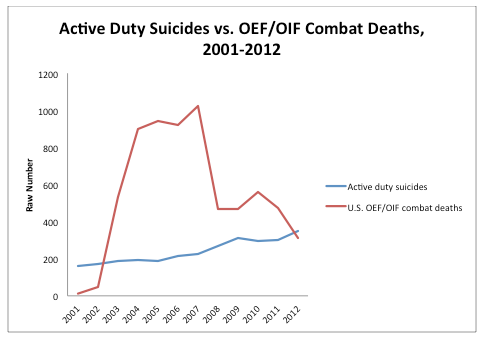A soldier is buried in the rain at Arlington National Cemetery.
On January 14, immediately after the release of the military’s 2012 suicide data, many in the media repeatedly aimed at a single target. According to the Associated Press, the number of active-duty suicides in 2012 reached an all-time record—with the 349 self-inflicted deaths “far exceeding American combat deaths in Afghanistan” during the same period.
The storyline of more troops committing suicide than being the killed by the enemy sounded compelling and it carried the news cycle—with outlets like the AP, ABC, and NBC covering it from that angle.
However, the lead aside, the reversal is not due primarily to a wild spike in active-duty suicides (though they were up, troublingly, 16% over 2011). Rather, the reversal is due primarily to the fact that the war in Iraq is over and the war in Afghanistan is entering its final stages.
There are simply far fewer troops dying in combat now than at any time in nearly a decade. So it’s only natural that the number of suicides would overtake the number of combat deaths at some point.
As you can see in the accompanying chart, it appears we’ve reached that point.
As more and more American troops exit Afghanistan in the next year, those casualty figures will fall even further, eventually reaching zero. The number of suicides will likely continue to rise for several years—even after troops leave Afghanistan—as many war veterans lose their sense of meaning and purpose. And then, they too will begin to fall.
Unfortunately, the number of suicides—unlike combat deaths—will never reach zero. And this means from today until the beginning of the next major American conflict, we will deal with more suicide in the ranks than combat deaths.
The end of these wars is a good thing. But it means the work of friends, families, communities, non-profits, and government is nowhere close to being complete when it comes to caring for the troops coming home.
Brandon Friedman is a Truman National Security Fellow and author of The War I Always Wanted. He worked at the U.S. Department of Veterans Affairs from 2009 to 2012. Follow him on Twitter at @BFriedmanDC.


